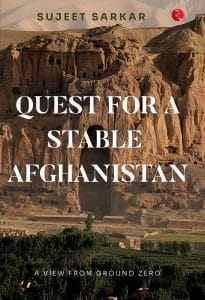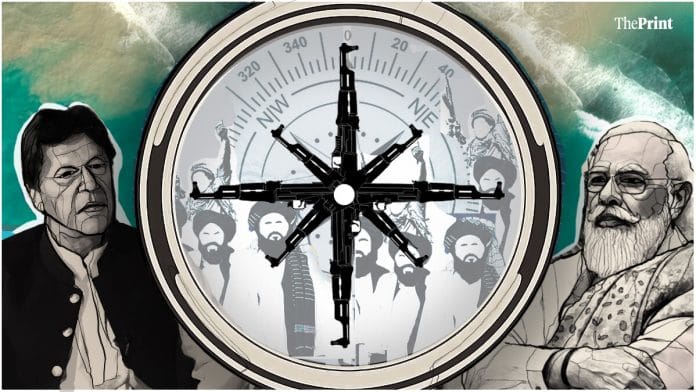A conventional military reaction is probably too costly for Pakistan, given its struggle with precarious finances. With India’s conventional military forces being far superior, Pakistan will always harp on asymmetrical means. Hence, Pakistan would continue to ride its most effective and time-tested strategies against India—using an array of militant groups as proxies to continuously bleed India. These groups that were operating in Afghanistan no longer have US troops to turn their gun, giving them the motivation to refocus their attention and pent-up energy on the Indian part of Kashmir. Their handlers in Pakistan would leave no stone unturned to motivate them with aid and equipment to target Indian interest. In the end, the brunt of Taliban-fuelled terrorism will be borne by India, which has already been described as ‘the sponge that protects the West’. It will take a lot to get Pakistan to change the calculus as well as its well-established and dividend-yielding track in Afghanistan.
India also has to deal with an aggressive China on its own. If China’s overarching shadows stretch over the Hindu Kush and canvas Afghanistan as a hub of the BRI, which seem quite evident, the great game will resume. With the US losing its hegemony in Afghanistan for a foreseeable future, India’s strategic relevance is bound to slide significantly in the region. The all-weather duo of Pakistan and China would restrict the strategic growth of India, along with its economic foray into the CAR too.
This is a seriously uncomfortable position to be in, after being one of the largest civilian donors of Afghanistan, and with a genuine intention to rebuild Afghanistan.
Also Read: Why Russia, US officials are rushing to Delhi, after keeping India away from Afghan talks
The long-running conflict between India and Pakistan has caused the US to be held hostage to the competing foreign policy goals between the two of them. The more aid the US gives to Pakistan to assist with counter-terrorism efforts, the more it is perceived as a threat to India by shoring up Pakistani military power. But when India stripped the Indian part of Kashmir of its autonomy, it was set to complicate the vexed issue of Afghanistan further. The US will further find it difficult to balance its Indo-Pak outreach. Pakistan, which has launched a major lobbying effort, would continue to impress Washington to reverse the move of India in Kashmir. Pakistan would even step up its engagement in solving the Afghan imbroglio, if the White House mediates the Kashmir issue with India. Like Trump, the Biden administration too is not buying the Pakistani argument that the road to peace in Kabul passes through Kashmir and rejects the hypothesis that the Kashmir issue and the Afghan problem are inter-related. India, in turn, has convinced the White House that the Kashmir issue is a bilateral conflict between India and Pakistan.
If the US asserts power to settle the long-standing dispute of Kashmir, it seriously risks cooling relations with India, which it can ill afford. India is needed for a long-term and a bigger role. This explains why the US is reluctant to speak out against the human rights violations in Kashmir. The US will be unable to defeat the Taliban without help from Pakistan. And prolonged silence on the part of the White House on Kashmir would rupture Prime Minister Khan’s new-found motivation to extend enhanced cooperation in getting the Taliban to ink a deal with the Afghan government for political settlement of Afghanistan. Every action to strengthen on one side annoys the other side. It is a vicious trap the US President walked into. The US foreign policy is largely dominated by its efforts to push back against what it views as a China threat. And India, with its similar rivalry with China, is perceived by Washington as the perfect and natural ally to help pursue that goal. Hence, Washington would desist from needling India on Kashmir, but at the same time not allow an open licence in Afghanistan.
In the meantime, everyone is looking at the newly elected US President Biden. As of now, he has maintained a much annoying silence on this prickly issue. He has neither chided Pakistan nor supported India on Afghanistan after assuming power. His silence has been extended on the vexed issue of Kashmir too with the fear of annoying one at the expense of the other. He can ill afford the silence for long. In every likelihood, President Biden would revise the timeline of US troop withdrawal without altering the basic structure of the peace deal. This will peeve the Taliban, but they will not lose out on anything even if the US abandons the peace deal. Hence, they are not much bothered about the new US policy, if any regarding Afghanistan. The Taliban dialogue with the Afghan government is almost broken, with no party showing up real intent and urge to conclude the peace deal.
Also Read: Afghanistan and Pakistan are in a strategic embrace that cannot have a happy ending
The relationship between Pakistan and Afghanistan is on the downturn, and continues to slip in the recent months. The casulity and the destruction are unprecedented in the war-strife history of Afghanistan. The rising border tension is a new addition to the long list of woes in the troubled bilateral relationship. Pakistan is unilaterally installing a robust fence along most of the frontier and believes it would address mutual security concerns. This is seriously contested by Kabul, as the Durand Line has been disputed and remains unsettled. The border dispute between Afghanistan and Pakistan has flared up significantly in the recent years, with frequent skirmishes and gun battles between the two forces leading to death of soldiers on both sides. The growing border tension and consequent killing may turn the Durand Line into a hotbed of border conflict, like the LOC between India and Pakistan, in Kashmir. These complex sets of issues have evoked anti-Pakistan sentiment within Afghanistan. The flare up of anti-Pakistan emotion has only strengthened pro-India sentiments among Afghans. It was reported that Afghans wildly celebrated the Balakot airstrikes by the Indian air force through social media.
Pakistan is also facing the heat with its rising unpopularity in Afghanistan. And it has no option, beyond the Taliban, to resurrect its falling image. The economy is in the throes of a collapse and its key international allies have either maintained silence over Kashmir or defected in support of India. There is an increasing international pressure on Islamabad to break its ties with the Taliban and other terrorist networks spreading unrest in Afghanistan. Pakistan is already in the grey list of FATF, a watchdog of an inter-governmental body mandated to combat money laundering and terrorist financing. China is holding its slippage from ‘grey’ to ‘black’ for the time being.
Also Read: In Afghanistan, extremists are targeting extremists. But the one in Kabul has no vision either
India may not be a primary player in Afghanistan. It is not secondary either. India has got the ability to influence the calculus of Afghanistan. There is too much at stake and New Delhi should become more proactively involved and not be shy of even shoring up military engagement with Afghanistan. The outgoing US President Trump said in his last phase of presidential career that India should also be fighting against terrorism in Afghanistan—Pakistan should be fighting more—and not just the US that is ‘7,000 miles away’. There are various ways of doing it, even without sending boots to the conflict-ridden country.
The Minister of External Affairs, S. Jaishankar said, ‘For India, the priority is a stable and plural Afghanistan and the defeat of the Taliban. This would ensure that the region is not a hotbed for terrorism and is instead a conduit to Central Asia.’ Between India and Pakistan, the soft power of the great game has clearly played out in favour of India, making it wildly popular among Afghans in the race of earning civilian goodwill. But Pakistan has unquestionably kept India behind them in the strategic race to gain dominance and extend influence in Afghanistan, in both the pre- and post-peace process era. But the strategic slippage should not become permanent and a standard template of regional politics. It is time for India to get even. This is important not only because India’s interests are involved, but also because the hopes and aspirations of ordinary Afghans cannot be trampled to satisfy the evil agenda of any single power. New Delhi should make it clear that India can win the strategic race too.

This excerpt from ‘Quest for a Stable Afghanistan: A view from Ground Zero’ by Sujeet Sarkar has been published with permission from Rupa Publications.






